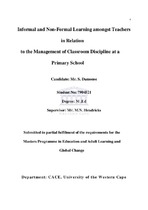| dc.description.abstract | South Africa has undergone major transformation after the election of the first democratic government in 1994. The acceptance of a humane constitution as well as equal rights for all its citizens necessitated the banning of corporal punishment in all schools under the South African Schools Act 84 of 1996. Accordingly, this change in the education policy as well as a change in society regarding equal rights for all citizens required teachers to adjust and improve their practices related to classroom management and discipline. The abolition of corporal punishment in 1996 (South African Schools Act 84 of 1996) can thus be regarded as such a changed aspect which required teachers to find alternative ways of keeping discipline in schools. It is expected from teachers to manage learning in classrooms, while at the same time practise and promote a critical, committed and ethical attitude towards the development of a sense of respect and responsibility amongst learners. It is with this in mind that one should remember that classroom locations and environments are complex as well as dynamic. Learners can now use their rights in a court of law while at the same time become more unruly, disruptive and at times even violent. Teachers on the other hand are left with limited alternative procedures or guidelines to manage unruly learners. As such, teachers now rely on their own informal learning in order to deal with such learners since alternatives to manage ill-disciplined learners are not included in formative teacher training courses. This study therefore concerns itself with the way teachers acquire classroom management skills in the absence of corporal punishment and learn how to deal with behavioural problems in order to carry on with day-to-day classroom activities. This is essentially viewed as informal learning. Because of the absence of much-needed training and support from educational authorities, teachers adjust and improve their practice, relying on hands-on experience in classrooms since they only incidentally receive opportunities to engage in ongoing formal professional development. This study explores the nature and content of informal/incidental as well as nonformal (courses not leading to formal accreditation) teachers learning related to managing classroom discipline in the absence of corporal punishment and investigates how skills, to manage classroom discipline, impact on the learning and teaching enterprise. A qualitative approach within the interpretive paradigm was followed throughout this study. Unstructured interviews were used to gather data which resulted in the gaining of rich detailed descriptions of participants responses to acquiring classroom management skills. This qualitative investigation included a literature review that explored and analysed different perspectives on the learning process. This study confirms that teachers acquire classroom management and discipline skills through workplace learning, initiated by themselves as well as collaboratively through interaction with colleagues and learners. Learning within the workplace was possible due to the opportunities they were afforded within the working context they found themselves in. | en_US |

